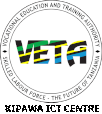OBJECTIVES
The overall objectives of VETA according to Act No. 1 of 1994 are:
- to provide vocational education opportunities, and facilities for such training;
- to establish a vocational education and training system which includes both basic and specialized training to meet the needs of both the formal and the informal sectors;
- to satisfy the demands of the labour market for employees with trade skills in order to improve production and productivity of the economy;
- to ensure that the system of vocational education and training is based on demand, is cost effective and given a gradual decentralized planning and implementation authority to the regions to ensure maximum utilization of resources and relevance of training programmes;
- to foster and promote entrepreneurial values and skills as an integral part of training programmes;
- to promote on-the-job training in industry for both apprenticeship training and for skill up-dating and upgrading;
- to promote access to vocational education and training for disadvantaged groups;
- to secure adequate and stable financing of the vocational education and training system;
- to raise the quality of vocational education and training being provided;
- to promote and provide vocational education and training according to needs, within the framework of the over all national socio-economic development plans and policies;
- to promote a balancing of supply and demand for skilled labour in both wage employment and for skills needed for self-employment in rural and urban areas;
- to promote and provide short tailor-made course programmes and in-service training in order to improve the performance both of quality and productivity of the national economy;
- to provide a dual vocational education and training system, combining broad based training with gradual specialization and practical experience from work and;
- to promote flexible training approach and appropriate teaching methodologies.
It is from the above mentioned grounds that VETA kept on establishing centers in various areas in Tanzania to make equitable access of its services for all Tanzanians.
Of recent, 4 new centers were established in 2012 one being KIPAWA INSTUTUTE OF ICT charged to foster ICT related activities particularly PC Maintenance and Network, Graphic Design and Multimedia, Web Design and Programming, Electronics and Electrical and automation to start with.
Being part of VETA the Institute is tasked to promote skills and imparts appropriate technical knowledge to our citizen. VETA KIPAWA is set to spearhead the technical training, development and use of ICT to address the national poverty reduction and empowerment strategy. However all these developments need adequate and well-trained human resource, It is in this spirit that VETA KIPAWA sees the need to establish a world-class technical education Certificate in 2012 and Diploma in ICT related courses in 2013 that are accredited by a reputable accreditation body to contribute to the national capacity building. In this case the National Council for Technical Education (NACTE) is the sole body at our disposal.
VETA KIPAWA using guidelines provided by NACTE in preparing a programme leading to the award of Basic -Technician Certificate (NTA level 4) in trades mentioned above.
Together with all these, a graduate vocational training for six months will be prepared to equip them hand on skills before being employed or for employees to sharpen their carriers.

